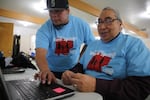The pandemic has sharpened divides that were already there — divides between who is most at risk of being exposed to disease, where health resources are funneled, and what political power looks like as disputes between local, state and federal jurisdictions grow more heated.
On sovereign tribal lands within Oregon, leaders are reflecting on these problems in light of a once-in-a-decade tool used to redistribute money and power: the U.S. Census.
Tribal nations are going big on Census 2020, with advocates deep into a public relations campaign to get people to fill out forms by mail or online. The goal is to limit how much ground that field teams will need to cover starting in August, when census takers will go door-to-door to gather data from people who haven't responded.

Scott Kalama helps Louie Pitt fill out a census form online in Warm Springs, March 12, 2020.
Emily Cureton / OPB
Last time around, people living on reservations were the most under-counted group. Now, they’re among those groups hardest hit by the pandemic and in need of more resources.
In Oregon, the rate of COVID-19 cases among American Indians, Alaska Natives, and Black people has been almost four times that of whites, Oregon Health Authority data shows. Meanwhile, social restrictions to contain the virus have closed businesses that once supported sovereign tribes.
“We can’t sit this one out and watch the rest of the country recover, while we continue to struggle,” said Nicole Adams, a communications consultant and Colville tribal member.
She joined more than 100 participants at a recent virtual event hosted by the We Count Oregon campaign. The event was broadcast on KWSO and KCUW, radio stations serving two of Oregon's largest Indian reservations, Warm Springs and Umatilla.
Adams linked Native American people bearing more disease burden to the lack of resources available to Native American health care systems.
"That's a direct result of our numbers not reflecting our actual populations," she said, echoing arguments made by experts with the American Medical Association, which has advocated for better racial and ethnic data on COVID-19's impact.

Sunlight hits gallon jugs inside a classroom in a former school on the Warm Springs Indian Reservation, Aug. 2, 2019.
Emily Cureton / OPB
An accurate Census count matters for how pandemic recovery resources will be distributed, the Tribal advocates said. But the campaign faces considerable barriers.
On the Warm Springs reservation, the largest stretch of sovereign land within Oregon, school officials say 50% of families lack access to the internet or the devices they need to connect. Meanwhile, mail in Warm Springs doesn’t get delivered to homes, but the Census Bureau won’t send questionnaires to P.O. boxes.
Census workers said they have begun personally dropping questionnaires off across the 164,000-acre reservation.
“Our whole strategy here was to do community events with food and have computers set up with people to assist, so folks could just do the Census online. There’s still time to get everyone to do it, but the sooner the better,” said Cheryl Tom, the Warm Springs tribal liaison to the local community counts committee.
Fear also contributes to low Census participation across tribal lands, several advocates who participated in the We Count forum agreed. The same U.S. government that carried out genocide on Native American people now wants to be trusted with their personal information.

Se-ah-dom Edmo, #WeCountOregon Tribal Community Coordinator and co-host of the Census and Sovereignty event broadcast on Tribal Lands within Oregon on June 10, 2020.
Emily Cureton / OPB
We Count forum moderator Se-ah-dom Edmo, who is Shoshone-Bannock, Nez Perce and Yakama, read the first question to pop up in the virtual chat bar: “What law protects Census information?”
“Title 13 of the United States Code,” replied voting rights attorney James Thomas Tucker of the Native American Rights Fund.
The Census is used to determine how many Congressional representatives communities have, and where the lines are drawn for voting districts.
“We need somebody to represent us on a federal level to make sure that people know we are here, and that we are not giving up. We are not giving up one piece of land, not one ounce of water that we don’t have to,” state Rep. Tawna Sanchez said at the forum.
Sanchez, a Democrat representing North and Northeast Portland, said she is just the second Native American to ever serve in the Oregon Legislature.
Her message about how tribal sovereignty, political representation and the Census interact came on the heels of biting satire.
Ryan RedCorn, a member of the Osage Nation and co-founder of the 1491s — an indigenous comedy troupe — appeared in character as “Kenny Crawford,” a spoof of a white Oregon Census worker.

Comedian Ryan RedCorn satirizes "Oregon's most experienced census worker."
Emily Cureton / OPB
In the performance piece, “Crawford” blithely makes racist remarks, and says he likes to go rock collecting at sacred sites.
“It’s perfectly fine,” RedCorn deadpanned during the sketch. “I’m with the government. And you know it’s pretty exhausting doing all that collecting. So, if there’s any time left in the day, I just Google Map the area that I’m in, and then just guess how many people live there.”
That got a single, hearty laugh. Most of the people in the video call room were muted.
